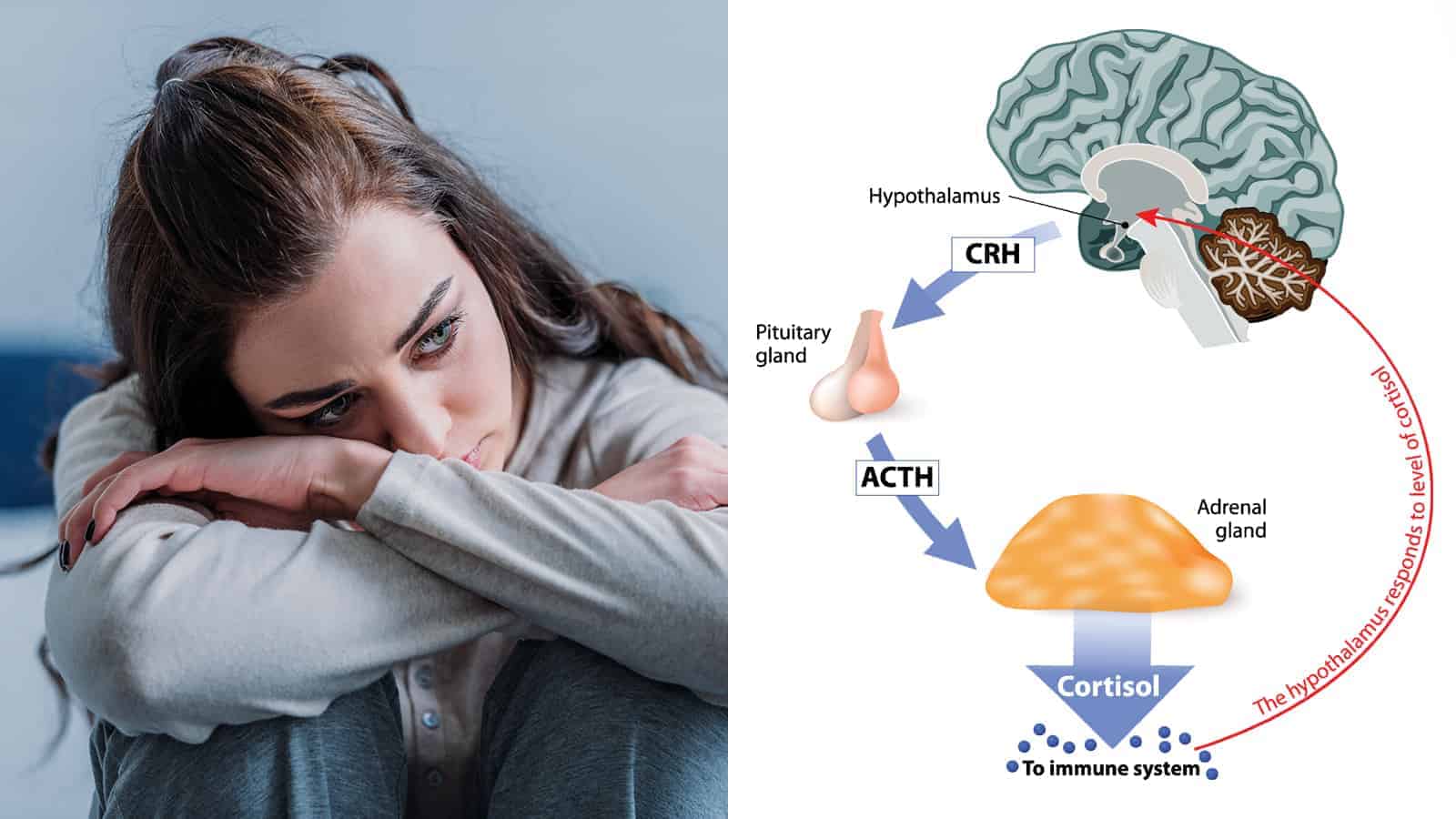Elevated stress hormones connect to poorer mental health. Countless studies have documented this relationship, but scientists have recently uncovered more about the dynamics. A new study confirms the function of glucocorticoid hormones (‘stress hormones’) and how they affect the brain. The research could have important implications for the prevention and treatment of mental disorders.
Researchers from the University of Bristol performed the study, which was published in Nature Communications. The team found a link between two corticosteroid receptors – the mineralocorticoid receptor (MR) and the glucocorticoid receptor (GR) – and ciliary and neuroplasticity genes in the hippocampus. This area of the brain helps with stress adaptation, learning, and memory.
Glucocorticoid hormones are cholesterol-derived stress hormones synthesized by the adrenal gland. They’re critical in healthy nervous system functioning and restoring homeostasis after a stressful event. When the body secretes excess or scant amounts of these hormones, it can lead to stress-related mental disorders.
Our bodies require a certain level of stress to function properly. However, chronic stress contributes to long-term negative health consequences. Unfortunately, in our modern world, more adults than ever live with constant stress. The American Psychological Association even refers to stress in America as a “national mental health crisis.”
About the Study of How Stress Hormones Worsen Mental Health Disorders
With this in mind, researchers wanted to understand what happens in the brain during a stressful event. The research team focused on uncovering what genes MR and GR interact within the hippocampus. They wanted to compare this activity during normal brain function and after a stressful event. Finally, they analyzed whether these interactions would change how the genes functioned and expressed themselves.Using advanced next-generation sequencing, bioinformatics, and pathway analysis technologies, the team hoped to understand more about the relationship between stress hormones and mental health. Their findings uncovered new information about the relationship between MR and cilia function.
Why Stress Hormones Contribute to Mental Health Disorders
Cilia are microscopic, hairlike vibrating structures that extend from the surface of almost all mammalian cells. Well-functioning cilia help with crucial primary functions, including brain development and recurring brain plasticity. However, before this research, how cilia impacted neural development was mostly a mystery.
Scientists now have a better understanding of the crucial role of MR in cilia structure and function in neuronal development. They hope that the research could lead to treatments for cilia-related (developmental) disorders in the future.
Additionally, the researchers discovered that MR and GR interact with numerous genes involved in neuroplasticity processes. These include neuron-to-neuron communication as well as learning and memory functioning. However, a percentage of these genes have been associated with the development of mental disorders, such as:
- major depression
- anxiety
- PTSD
- schizophrenia spectrum disorders
As a result, dysfunctional stress hormones could impact mental health by acting on these ciliary and neuroplasticity genes. This groundbreaking study helps better explain the well-known relationship between glucocorticoids and mental health disorders.
Of course, the findings beckon further research in the future on how stress hormones help regulate these genes. However, this new research solves some of the mystery about the association between stress hormones and mental health. It also identifies specific receptors in the brain that act on vulnerability genes.
Hans Reul, Professor of Neuroscience in Bristol Medical School: Translational Health Sciences (THS), said: “This research is a substantial step forward in our efforts to understand how these powerful glucocorticoid hormones act upon the brain and what their function is.
“We hope that our findings will trigger new targeted research into the role these hormones play in the aetiology of severe mental disorders like depression, anxiety and PTSD.”
In the future, the team will study how chronic stress impacts stress hormone action via MR and GR on the hippocampus genome. A BBSRC grant will also allow them to analyze glucocorticoid action via MR and GR upon the female brain genome. The impact of stress hormones on females isn’t widely known, as most previous research in this area involved males.
Five ways to lower stress hormones naturally, at home
We can’t totally escape stress in the modern world, but we can learn to manage it more effectively. If you’ve been feeling more stressed lately, try these natural remedies:
- Prioritize sleep. When you don’t get proper sleep, it throws your cortisol levels out of whack. Make sure to get at least 7-8 hours of sleep per night and maintain a regular sleep schedule.
- Exercise regularly. Studies have consistently found that exercise helps relieve stress, improves sleep quality, and reduces cortisol. Aim for at least three hours of moderate aerobic exercise each week and one or two hours of strength training.
- Practice mindfulness. Much of the stress in our lives comes from our response to events rather than the situations themselves. Becoming more aware of our thoughts by practicing meditation or other mindfulness techniques can greatly reduce stress. By simply observing your thoughts without judging or reacting to them, you can exert more control over your life.
- Eat a balanced diet. It’s been well-documented that poor nutrition can cause mental and physical health problems. For example, one study found that a diet high in added sugar, refined grains, and saturated fat increased cortisol levels. A diet high in whole grains, fruits, vegetables, and polyunsaturated fats had the opposite effect.
- Breathe deeply. Have you ever noticed that your breathing gets shallow and fast when you’re stressed? By practicing deep breathing techniques, you can activate your parasympathetic nervous system, which helps lower stress hormones.
Final thoughts on why stress hormones can cause mental disorders
The majority of people today seem to deal with chronic stress. This may explain our overall poor health, as researchers have linked elevated stress to numerous conditions. In a new study, a research team found that stress hormones impact certain genes in the brain. These ciliary and neuroplasticity genes in the hippocampus help with vital brain functioning. However, they also can lead to mental health disorders when the glucocorticoid receptors are impaired.
Researchers hope this groundbreaking information will lead to better treatments for mental disorders. By keeping stress hormones in check, hopefully, we can all enjoy a more peaceful existence.
















 Community
Community

